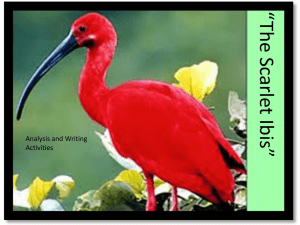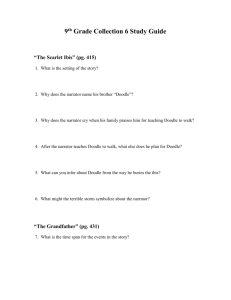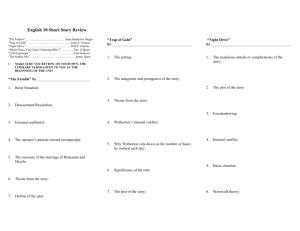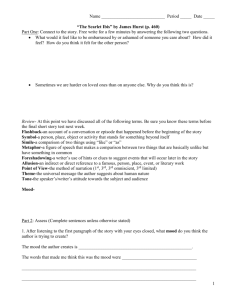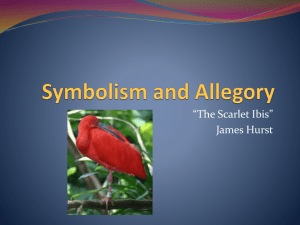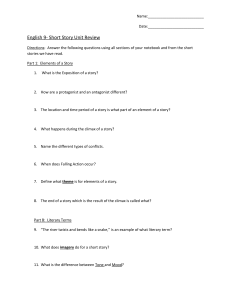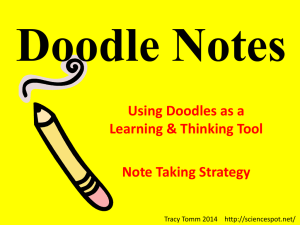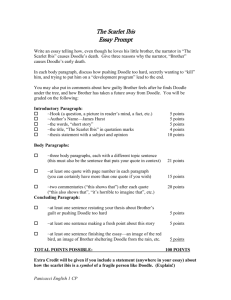“The Scarlet Ibis” Discussion notes
advertisement
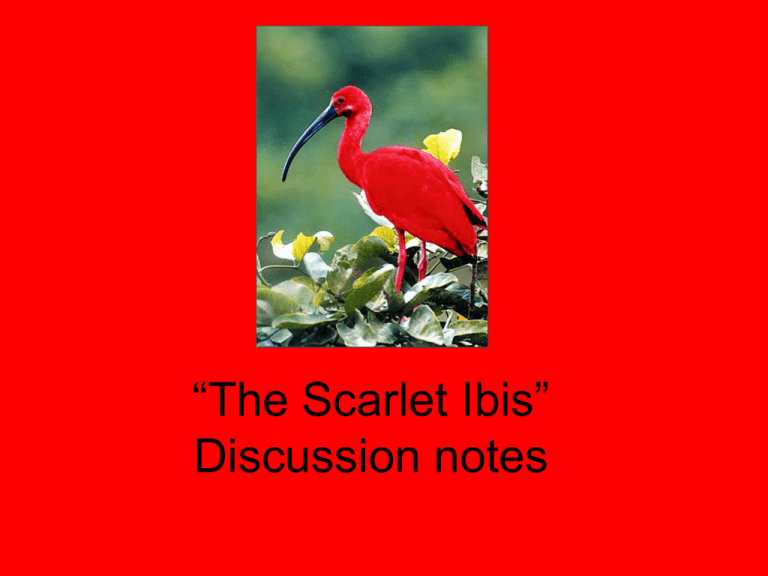
“The Scarlet Ibis” Discussion notes The narrator • First person point of view • Told in flashback • How old is the narrator before the flashback? • “But sometimes (like right now), as I sit in the cool, greendraped parlor, the grindstone begins to turn, and time with all its changes is ground away– and I remember Doodle.” Doodle as a baby • The narrator is disappointed • He wanted someone to play with, yet all he sees is a physically disabled baby who might die • He even considers smothering his little brother until he discovers that Doodle is not mentally disabled- he is “all there”! What does it mean to be “all there”? Characterizing the narrator • Characterization- much of what we learn about the narrator is based on his words, thoughts, or actions regarding his brother • Is the narrator dynamic or static? Support your answer. Doodle at Two • The narrator feels Doodle is part of the family since he begins to crawl and could be brought out of the bedroom • He renames William Armstrong because he crawls backward like a doodlebugplus, nobody expects much from someone called Doodle Doodle and the Go-Cart • Doodle is a burden because the narrator must take him everywhere, and Doodle needs special care • The narrator is cruel to Doodle • After he accepts that Doodle is his brother and inescapable, the narrator shares Old Woman Swamp with him Doodle at Five • The narrator is embarrassed that his brother cannot walk • The narrator needs to be proud of someone or something • The narrator forces Doodle to stand and to walk Doodle’s Sixth Birthday • The narrator realizes that he taught Doodle to walk because the narrator was ashamed of Doodle not walking • The narrator realizes that his motives in teaching Doodle to walk were purely selfish - PRIDE! Setting and Tone • The author makes great use of setting in his story; he uses it to establish the tone, to provide foreshadowing, and to provide symbolism • Time- 1912-1918- WWI (ends in 1918)- destruction – the blight damaging the crops can be compared to the destruction the war causes to people and places • “And during that summer, strange names were heard through the house: Chateau-Thierry, Soissons, and in her blessing at the supper table, Mama once said, “And bless the Pearsons, whose boy Joe was lost in Belleau Wood” James Hurst’s Hope • He wants the readers of “The Scarlet Ibis” to think of how the war raging among “brothers” in Europe is related to the conflict between Doodle and his brother. • He reflects, “People always suffer when others try to make them over in their own image.” United States soldiers fire a machine gun in Belleau Wood, France, in June 1918. Setting and Tone • Place-North Carolina; cotton farm; Old Woman Swamp • Atmosphere- clove of seasonssummer is dead & autumn is not born • Summer was blighted- crops withered, curled up, and died • What is the tone of this story? How does the setting help to develop this from the first paragraph? Foreshadowing • Summer of 1918 was blighted- plant growth replaced by death and decay • Fall of Ibis- Doodle’s fall • Doodle’s response to the Ibis • “Dead birds is bad luck…Specially red dead birds!” Allusion- new literary term • Allusion- a reference in a work of literature to a well-known character, place, or situation from literature, music, mythology, film, religion (especially the Bible), art, or history. • The Family Guy frequently uses allusions. Ex. This scene is an allusion to a scene in The Lady and the Tramp. Three Allusions in our story 1. Belleau Woods- WWI battle sites 2. Hansel and Gretel- “It was too late to turn back, for we had both wandered too far into a net of expectations and had left no crumbs behind.” 3. “If we produced anything less than the Resurrection, [Aunt Nicey] was going to be disappointed.” Imagery • Imagery is descriptive language that deals with any of the five senses (sight, touch, smell, hearing, and taste), and even movement. • Essentially, imagery is any series of words that create a picture, or sensory experience in your head. • The use of figurative language (similes, metaphors, and personification) helps create imagery in writing. Let’s look at some examples. Examples • “…with a tiny body which was red and shriveled like an old man’s”- simile that appeals to the sense of sight • “…curtains billowed out in the afternoon sea breeze, rustling like palmetto fronds”- simile that appeals to the sense of sight and provides movement • “Even death did not mar its grace, for it lay on the earth like a broken vase of red flowers.” –simile that appeals to the sense of sight • “The [rain] drops stung my face like nettles”- simile that appeals to the sense of touch • Nettles are covered with tiny, nearly invisible stinging hairs that produce an intense, stinging pain, followed by redness and skin irritation. Death Imagery • • • • • • Bleeding tree Rotting brown magnolia Ironweeds grew rank Graveyard flowers Mahogany box Black clouds, darkness descended Other Examples of Similes and Metaphors • Simile- William Armstrong’s name is like putting a big tail on a small kite • Metaphor- “There is within me (and with sadness I have watched it in others) a knot of cruelty borne by the stream of love, much as our blood sometimes bears the seed of our destruction…”- The narrator’s cruelty is being compared to a disease that kills . • Metaphor- “Pride is a wonderful, terrible thing, a seed that bears two vines, life and death.” • Simile- “Promise hung about us like leaves” • Simile- “Hope no longer hid in the dark palmetto thicket, but perched like a cardinal in the lacy toothbrush tree, brilliantly visible.” (red cardinal is compared to a sense of hope) Symbols • A symbol is a thing or idea that stands for something else • The main symbol in the story is the scarlet ibis which stands for Doodle • Why does the author choose the scarlet ibis as the symbol as opposed to another bird? • With what is red usually associated? Why choose a red bird and develop red imagery? Key Lines that Develop Theme • “There is within me (and with sadness I have watched it in others) a knot of cruelty borne by the stream of love, much as our blood sometimes bears the seed of our destruction…” • “All of us must have something to be proud of” • “Pride is a wonderful, terrible thing, a seed that bears two vines, life and death.” What is the theme of this story?
